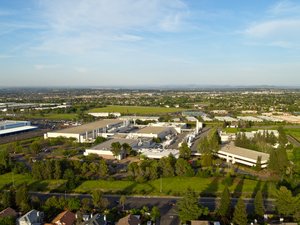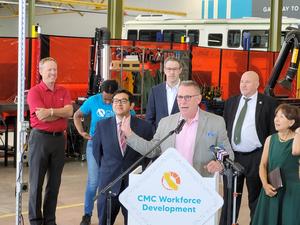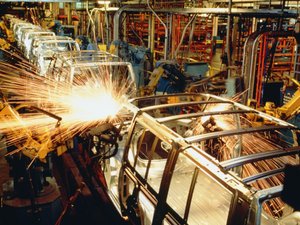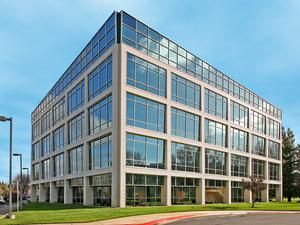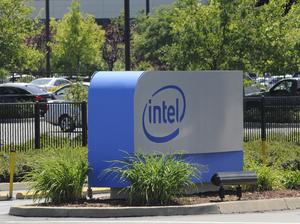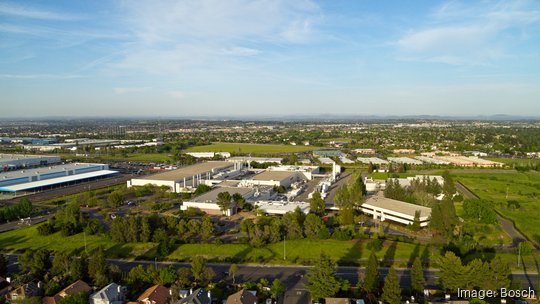
The chairman of Bosch said the German company is acquiring Roseville-based TSI Semiconductors' chip fabrication plant to quickly bring a new generation of silicon carbide chips to market.
In an interview on Bloomberg Television, Stefan Hartung, chairman of Stuttgart-based Bosch's board of management, said he wants the Roseville plant to start delivering chips primarily to the automotive market by 2026.
"The most important factor for buying this facility and the people on board (is) we get a 10,000-square-foot facility which is ready to refurbish. That gives us a speed access," Hartung said. "The fundamental thing is the speed game. Because you have to be fast enough. We want to produce and deliver chips in 2026, so it is a bit of a race."
He declined to disclose the value of the purchase of TSI, but he said the company will invest $1.5 billion into the Roseville chip fabrication plant with new equipment and renovations.
"The important part is that we buy the assets of TSI, and we take over the 250 people on the facility in Roseville, which is a facility from 1984. And here you can see that this is just the start of a venture. We are on a venture start where we will invest $1.5 billion."
The Bosch investment will produce silicon carbide chips, which "is the product that is very much needed in the auto industry in the next years," he said. "We see a lot of demand coming very quickly."
Silicon carbide chips "allow for higher efficiency for driving so the electric vehicle needs less batteries to carry around," he said.
In reaction to Bloomberg reporters' questions about the role of the CHIPS and Science Act in the purchase and siting of the plant in the U.S., Hartung said that funding was a "good support" and "that also helps and is also great," but he added that speed was more important.
"There is a time game we have. So that is a fundamental reason," Hartung said.
The CHIPS Act, passed by Congress and signed by President Biden last year, provides funding to increase domestic semiconductor production in the U.S.
Bosch still needs to qualify the Roseville site for manufacturing these new chips.
Bosch currently uses specialty chips from German-based Infineon Technologies AG and North Carolina-based Wolfspeed Inc. (Nasdaq: WOLF).
It will continue to use those power control chips, as well as computer chips from other manufacturers such as Intel Corp. (Nasdaq: INTC).
He said Bosch doesn't want to be reliant on other manufacturers.
"We follow that strategy that we produce part of that demand ourselves all the time," Hartung said.
Hartung said Bosch has grown to have 40,000 software engineers, and that workforce is growing to develop chip controls and operating systems.
At its peak, the Roseville plant had 1,600 employees in 700,000 square feet of space at 7501 Foothills Blvd.
That plant now has 250 employees working in clean-room environments making energy control chips for industry and the auto market.
Silicon carbide chips, specifically, are expected to see 30% average market growth annually, driven mostly by growth in electric vehicles, and Hartung said that estimate is conservative.
Silicon carbide chips allow electric vehicles to drive farther and charge more efficiently. Hartung said Bosch is also interested in technology for hydrogen-based drivetrains.
Bosch's announcement also apparently ends the TSI Semiconductors name, established a decade ago after Telefunken Semiconductors International LLC bought the plant from Renesas Electronics two years earlier.
In recent years, the TSI plant has made power control chips, as well as chips rated for the automotive industry, where chips must be able to sustain high heat, extreme cold, vibration and impacts.
The silicon carbide semiconductors that Bosch plans to make in Roseville are able to operate at higher voltages, frequencies and temperatures than regular silicon wafer chips. Those added extremes makes the silicon carbide chips ideal for electric vehicle, 5G wireless and other demanding applications.
